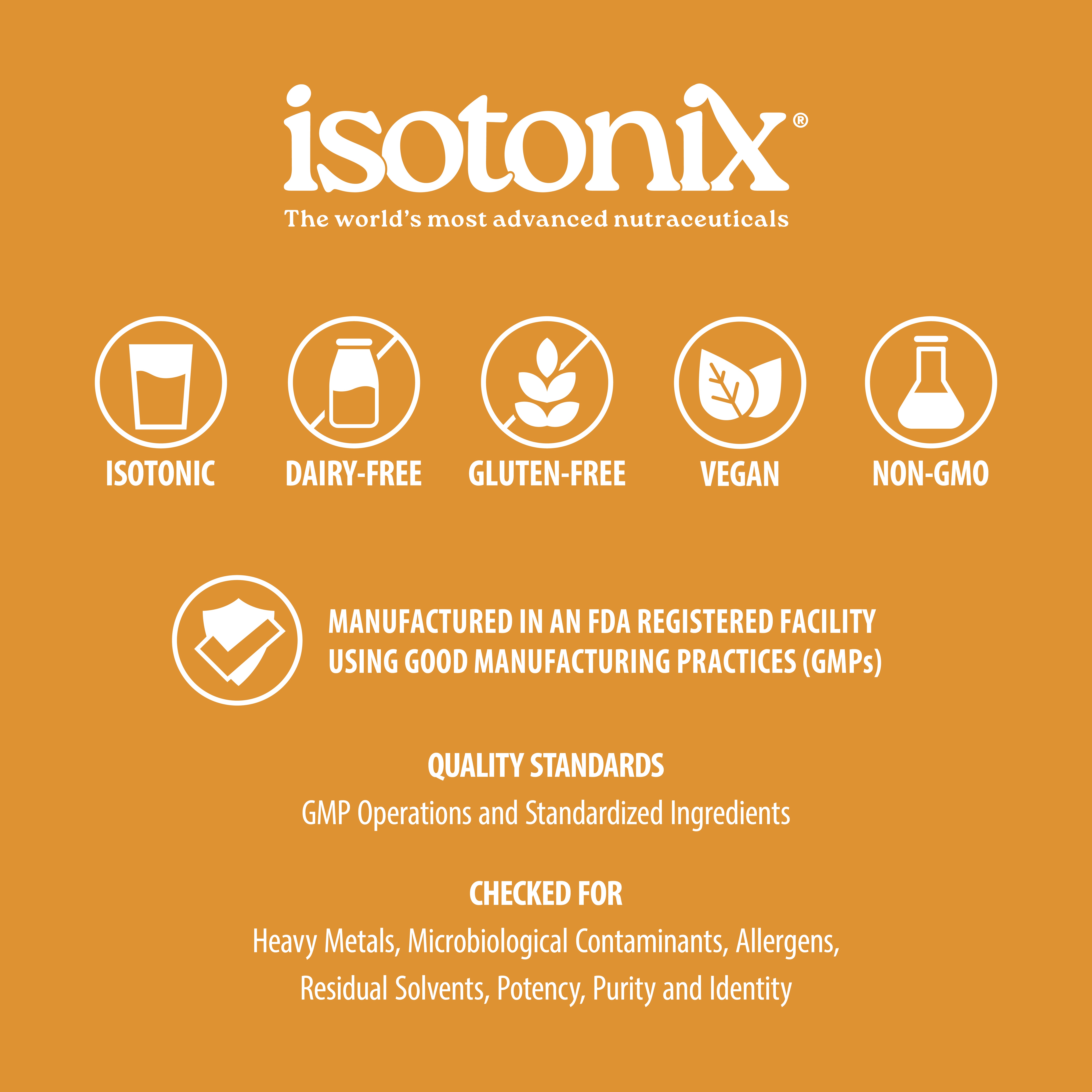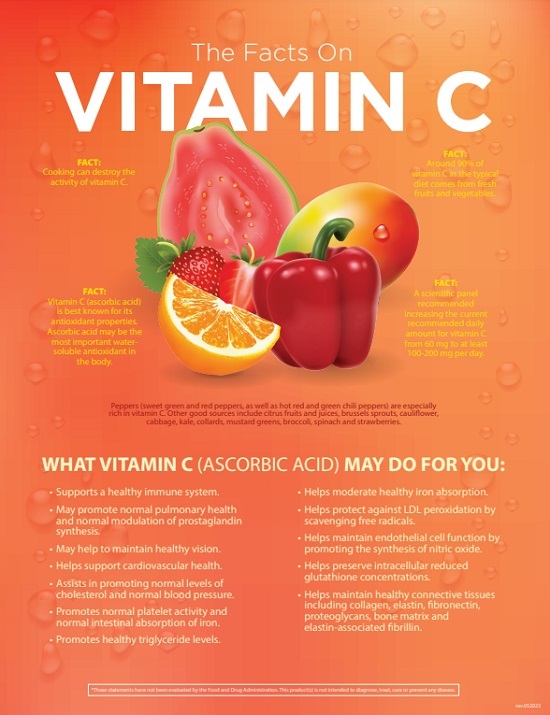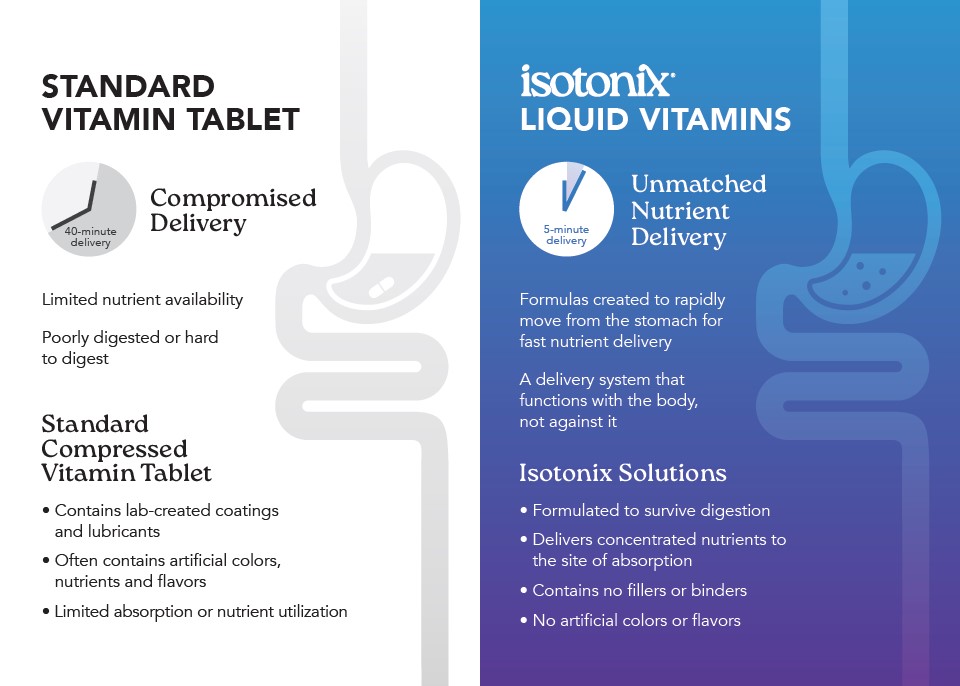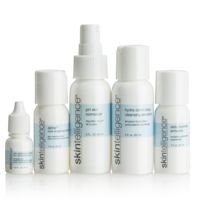Look Good
Feel Good
Hydrate & Protect
Due to high demand, this product is temporarily out of stock. Available on 07/11/2025.
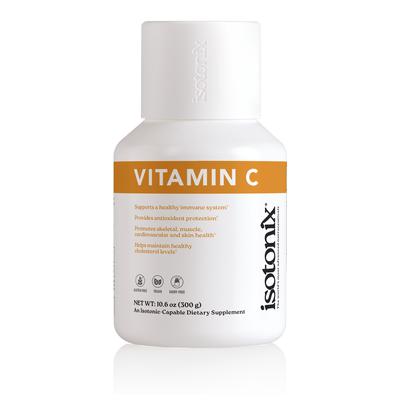
Isotonix® Vitamin C
sku 13033
$38.95
$ 0.78 Cashback
This product qualifies for free or reduced cost shipping. Learn More
Primary Benefits* of Isotonix® Vitamin C
Antioxidant support.
- Promotes optimal immune functions
- Provides antioxidant protection
- Promotes normal regulation of heart functions
- Promotes cognitive health
- Promotes skeleton, muscle and skin health
- Helps maintain healthy cholesterol levels
Antioxidant Support
What Makes Isotonix Vitamin C Unique?
The two most important factors when searching for the best quality nutritional supplements are absorption and potency. Isotonix supplements, when mixed with water, have the same pH and osmotic pressure as the body's fluids, such as tears, plasma and blood. In order for meaningful absorption of nutritional content to take place, all food must be converted into an isotonic state. This process could take up to three hours. This time consuming process limits the amount of nutrients absorbed by the body. However, our Isotonix® Vitamin C sets itself apart from other products on the market providing you with the maximum absorption of the nutrients within the product in the shortest amount of time.
All in all, Isotonix Vitamin C provides superior delivery of the nutrients your body needs in the most cost effective way. According to researchers at the University of Leeds, Guys Hospital in London, Baylor University and the Mayo Clinic, among others, have shown that not only do isotonic solutions leave the stomach faster, but also that the osmotic pressure of the stomach contents is one of the controlling mechanisms for the rate at which the stomach empties leading to more efficient assimilation by all of the body's systems. The liquid composition of Isotonix Vitamin C Formula places the vitamins and minerals in an optimal position for absorption and superior delivery to the body's systems. Isotonix Vitamin C is an exemplary product that leaves you with peace of mind, knowing that you are doing the most and the best for your health.*
*These statements have not been evaluated by the Food and Drug Administration. This product(s) is not intended to diagnose, treat, cure or prevent any disease.
Product Classifications
Gluten-Free - The finished product contains no detectable gluten (<10ppm gluten)
No Detectable GMOs - The finished product contains no detectable genetically-modified organisms
Vegan - The product is made without ingredients produced by or derived from animals
Isotonic-Capable Drinkable Supplements - Easy-to-swallow supplements in liquid form are immediately available to the body for absorption
Quality Standards - GMP Operations and Standardized Ingredients
Checked For: Heavy Metals, Microbiological Contaminants, Allergens, Residual Solvents, Potency, Purity and Identity
Isotonix Delivery System
Isotonix - the World's Most Advanced Nutraceuticals
Isotonic, which means “same pressure,” bears the same chemical resemblance of the body’s blood, plasma and tears. All fluids in the body have a certain concentration, referred to as osmotic pressure. The body’s common osmotic pressure, which is isotonic, allows a consistent maintenance of body tissues. In order for a substance to be absorbed and used in the body’s metabolism, it must be transported in an isotonic state.
Isotonix food supplements are delivered in an isotonic solution. This means that the body has less work to do to in obtaining maximum absorption. The isotonic state of the suspension allows nutrients to pass directly into the small intestine and be rapidly absorbed into the bloodstream. With Isotonix products, little nutritive value is lost, making the absorption of nutrients highly efficient while delivering maximum results.
Key Ingredients
Vitamin C (Ascorbic Acid)
Around 90 percent of vitamin C in the typical diet comes from fresh fruits and vegetables. Peppers- sweet green and red peppers and hot red and green chili peppers- are especially rich in vitamin C. Other good sources include citrus fruits and juices, brussels sprouts, cauliflower, cabbage, kale, collards, mustard greens, broccoli, spinach and strawberries. It is important to note that cooking destroys vitamin C activity.
Vitamin C, justifiably so, has become the world's most popular vitamin. The reasoning behind this vitamin's grand reputation is at once multi-faceted as well as amazing. The bodily functions promoted by this vitamin create an extensive list. Ascorbic acid is best known for its antioxidant properties. Ascorbic acid may be the most important water-soluble antioxidant in the body. The capacity of vitamin C to support the immune system seems to be common knowledge. In support of an elevated vitamin C intake, an expert scientific panel recently recommended increasing the current RDA for vitamin C from 60 mg to at least 100-200 mg per day. Next, vitamin C may promote normal pulmonary health. Part of the protective action of vitamin C appears to be due to its antioxidant properties. Finally, some studies suggest that vitamin C supplementation will help to maintain healthy vision.*
Vitamin C helps support cardiovascular health in a few different ways. It assists in promoting normal levels of cholesterol and normal blood pressure and promotes normal platelet activity. It also promotes healthy triglyceride levels. Vitamin C protects against LDL peroxidation by scavenging free radicals. Vitamin C helps maintain endothelial cell function by promoting the synthesis of nitric oxide (also known as NO and EDRF for endothelium-derived relaxing factor). As mentioned above, vitamin C helps preserve intracellular reduced glutathione concentrations. This activity likely helps maintain nitric oxide levels and potentiates its vasoactive effects, helping to maintain the integrity of blood vessels.*
Vitamin C may promote normal modulation of prostaglandin synthesis, which in turn promotes normal vasodilatory activity. As observed above, vitamin C helps maintain nitric oxide levels and supports its ability to preserve the integrity of the blood vessels. There is an indication that vitamin C supports endothelial-dependent vasodilation. Vitamin C plays a crucial role in maintaining healthy connective tissues including collagen, elastin, fibronectin, proteoglycans, bone matrix and elastin-associated fibrillin. Also, a lack of vitamin C can cause general fatigue. Next, vitamin C helps moderate healthy iron absorption, transport and storage. It promotes the normal intestinal absorption of iron.*
Beta Carotene (Vitamin A Precursor)
Vitamin A is a fat-soluble vitamin that is part of a family of compounds including retinol, retinal and beta-carotene. Beta-carotene is also known as pro-vitamin A because it can be converted into vitamin A. The best sources of vitamin A includes organ meats (such as liver and kidney) egg yolks, butter, carrot juice, squash, sweet potatoes, spinach, peaches, fortified dairy products (such as milk and some margarines) and cod liver oil.
Vitamin A has exhibited anti-aging and antioxidant activities. Vitamin A helps to maintain vision. It promotes normal bone growth and also contributes to a healthy immune system. Vitamin A supports normal epithelial differentiation, growth, reproduction, pattern formation during embryogenesis, bone development, hematopoiesis and brain development. Children are particularly susceptible to the effects of vitamin A deficiency.*
Potassium (Bicarbonate)
Foods rich in potassium include fresh vegetables and fruits, such as bananas, oranges, cantaloupe, avocado, raw spinach, cabbage and celery. Potassium is an essential macromineral that helps to keep fluid balance. It also plays a role in a wide variety of biochemical and physiological processes. Among other things, it promotes the normal transmission of nerve impulses, the normal contraction of cardiac, skeletal and smooth muscle, the normal production of energy, the normal synthesis of nucleic acids, the maintenance of intracellular tonicity and the maintenance of normal blood pressure. Potassium promotes muscle relaxation, and supports normal insulin release. It also promotes normal glycogen and protein synthesis. Potassium is an electrolyte that promotes proper heartbeat, and it is important in supporting the normal release of energy from protein, fat and carbohydrates during metabolism.*
Potassium also promotes the normal regulation of water balance. Potassium promotes the normal elimination of wastes and generally contributes to a sense of well-being. Potassium is stored in the muscles. Some symptoms of potassium deficiency include poor circulation, earaches, inability to sleep, muscle weakness and water retention. Sodium and potassium are two of the most important ions in helping the body maintain the homeostatic equilibrium of fluids.*
FAQs
- What is the recommend daily allowance of Vitamin C?
The RDA for the average adult male is 90 mg a day and for adult females it is 75 mg a day. - Does Isotonix Vitamin C provides the recommended daily allowance?
Yes, Isotonix Vitamin C contains 500 mg of vitamin C per serving, which is an optimal amount for immune system maintenance. - Will Isotonix Vitamin C support my immune system?
Yes, in several ways. Vitamin C has been heralded for quite possibly being the best immune system supporter and antioxidant available today. People who take daily doses of vitamin C can support their immune system. Vitamin C supports the immune system by protecting the body from free radical damage. As a water-soluble vitamin, ascorbic acid performs its antioxidant functions within the aqueous compartments of the blood and inside cells and can help restore the antioxidant potential of vitamin E (a fat-soluble antioxidant). Support of immune cell function is also a key role performed by vitamin C. - Is Isotonix Vitamin C safe for children and their delicate systems?
Children should take DNA Miracles Isotonix Multivitamin which has a lower serving of vitamin C in the formulation. Vitamin C supplementation is especially beneficial for children.* - Who needs to supplement with Isotonix Vitamin C Formula?
Basically, everyone over 18 should use Isotonix Vitamin C Formula to add vitamin C to their diet because very few of us get the recommended five servings of fruits and vegetables in our daily diets. - Is it possible to take too much Isotonix Vitamin C Formula?
Ascorbic acid is extremely safe even at relatively high levels (because most of the excess is excreted in the urine). At high doses (over 1000 mg/day), some people can experience gastrointestinal side effects such as stomach cramps, nausea and diarrhea. It is recommended that you take vitamin C supplements in gradual servings throughout the day to achieve maximum benefits.* - How does Isotonix Vitamin C Formula aid in cardiovascular health?
It helps maintain healthy cholesterol and triglyceride levels. It promotes healthy arterial walls and supports normal blood pressure. It helps the body maintain vitamin E, which has known benefits for the cardiovascular system. Finally, vitamin C supports normal platelet activity.* - What is the best way to store this product?
Keep Isotonix stored in a dry, cool place. If Isotonix are stored in the kitchen, keep them away from the stove, sink, heat-generating appliances or window ledges. If you live in a very humid area, you may store Isotonix products in the refrigerator – but not in the fruit and vegetables area.
Science
- Bates CJ. Vitamin A. Lancet. 1995; 345:31-35. Bauer R, Jurcic K, Puhlmann J, Wagner H. Immunological in-vivo and in-vitro examinations of echinacea extracts. Arzneimittel-Forsch 1988;38:276-81.
- Bendich A. Antioxidant vitamins and human immune responses. Vitam Horm 1996;52:35-62:35-62.
- Carr A, Frei B. Does vitamin C act as a pro-oxidant under physiological conditions? FASEBJ. 1999; 13:1007-1024.
- Carr AC, Tijerina T, Frei B. Vitamin C protects against and reverses specific hypochlorous acid- and chloramine-dependent modifications of low-density lipoprotein. Biochem J. 2000; 346 Pt 2:491-496.
- Chapter 5 - Vitamin C. In: Dietary Reference Intakes for Vitamin C, Vitamin E, Selenium, and Carotenoids. A Report of the Panel on Dietary Antioxidants and Related Compounds, Subcommittees on Upper Reference Levels of Nutrients and Interpretation and Uses of Dietary Reference Intakes, and the Standing Committee on the Scientific Evaluation of Dietary Reference Intakes. Food and Nutrition Board, Institute of Medicine. National Academy Press:Washington, DC, 2000, pp. 95-185.
- Cosgrove J. Immune support-granting immunity. New ingredients join familiar favorites in the charge for immune enhancement. Nutritional Outlook 2000;41:4.
- Daudu PA, Kelley DS, Taylor PC, Burri BJ, Wu MM. Effect of a low beta-carotene diet on the immune functions of adult women. Am J Clin Nutr. 1994 Dec;60(6):969-72.
- Dietary Reference Intakes for Vitamin C, Vitamin E, Selenium, and Carotenoids. Washington, D.C.: National Academy Press; 2000.
- Friedman PA, Zeidel ML. Victory at C. Nature Med. 1999; 5:620-621.
- Futoryan T, Gilchrest BA. Retinoids and the skin. Nutr Rev. 1994; 52:299-310.
- Gamble J, Grewal PS, Gartside IB. Vitamin C modifies the cardiovascular and microvascular responses to cigarette smoke inhalation in man. Clin Science. 2000; 98:455-460.
- Halliwell B. Vitamin C: poison, prophylactic or panacea - Trends Biochem Sci. 1999; 24:255-259.
- Harding JJ, Hassett PC, Rixon KC, et al. Sugars including erythronic and threonic acids in the human aqueous humor. Curr Eye Res. 1999; 19:131-136.
- Hermans JJ, Fischer MA, Schiffers PM, Struijker-Boudier HA. High dietary potassium chloride intake augments rat renal mineralocorticoid receptor selectivity via 11beta-hydroxysteroid dehydrogenase. Biochim Biophys Acta. 1999; 1472:537-549.
- Hodison T, Socaciu C, Ropan I, Neamtu G. Carotenoid composition of Rosa canina fruits determined by thin-layer chromatography and high performance liquid chromatography. J Pharmaceut Biomed Anal. 1997; 16:521-528.
- Hornero-Méndez D, Minguez-Mosquera MI. Carotenoid pigments in Rosa mosqueta hips, an alternative carotenoid source for foods. J Agric Food Chem. 2000; 48:825-828.
- Hwang J, Peterson H, Hodis HN, et al. Ascorbic acid enhances 17 beta-estradiol-mediated inhibition of oxidized low density lipoprotein formation. Atherosclerosis. 2000; 150:275-284.
- Jayachandran M, Panneerselvam C. Cellular immune responses to vitamin C supplementation in aging humans assessed by the in vitro leucocyte migration inhibition test. Med Sci Res 1998;26:227-30.
- Jin L, ChaoL, Chao J. Potassium supplement upregulates the expression of renal kalikrein and bradykinin B2 receptor in SHR. Am J Physiol. 1999; 276:F476-F484.
- Kelly GS. Larch arabinogalactan: clinical relevance of a novel immune-enhancing polysaccharide. Altern Med Rev 1999;4:96-103.
- Lykkesfeldt J, Christen S, Wallock LM, et al. Ascorbate is depleted by smoking and repleted by moderate supplementation: a study in male smokers and nonsmokers with matched dietary intakes. Am J Clin Nutr. 2000; 71:530-536.
- McCabe RD, Backarich MA, Srivastava K, Young DB. Potassium inhibits free radical formation. Hypertension. 1994; 24:77-82.
- McCabe RD, Young DB. Potassium inhibits cultural vascular smooth muscle proliferation. Am J Hypertens. 1994; 7:346-350.
- Mowat C, Carswell A, Wirz A, McColl KEL. Omeprazole and dietary nitrate independently affect levels of vitamin C and nitrite in gastric juice. Gastroenterology. 1999; 116:813-822.
- Park JB, Levine M. Intracellular accumulation of ascorbic acid is inhibited by flavonoids via blocking of dehydroascorbic acid and ascorbic acid uptakes in HL-60, U937 and Jurkat cells. J Nutr. 2000; 130:1297-1302.
- Pauling L. Evolution and the need for ascorbic acid. Proc Natl Acad SciUSA. 1970; 67:1643-1648.
- Penn ND, Purkins L, Kelleher J, Heatley RV, Mascie-Taylor BH, Belfield PW. The effect of dietary supplementation with vitamins A, C and E on cell- mediated immune function in elderly long-stay patients: a randomized controlled trial. Age Ageing 1991;20(3):169-174.
- Peters EM, Anderson R, Theron AJ. Attenuation of increase in circulating cortisol and enhancement of the acute phase protein response in vitamin C-supplemented ultramarathoners. Int J Sports Med 2001;22:120-6.
- Podmore ID, Griffiths HR, Herbert KE, et al. Vitamin C exhibits pro-oxidant effects. Nature. 1998; 392:559.
- Raitakari OT, Adams MR, McCredie RJ, et al. Oral vitamin C and endothelial function in smokers: short-term improvement, but no sustained beneficial effect. J Amer Coll Cardiol. 2000; 35:1616-1621.
- Rehman A, Collis CS, Yang M, et al. The effects of iron and vitamin C co-supplementation on oxidative damage to DNA in healthy volunteers. Biochem Biophys Res Commun. 1998; 246:293-298.
- Rowe DJ, Ko S, Tom XM, et al. Enhanced production of mineralized nodules and collagenous proteins in vitro by calcium ascorbate supplemented with vitamin C metabolites. J Periodontol. 1999; 70:992-929.
- Satterlee DG, Aguilera-Quintana I, Munn BJ, Krautmann BA. Vitamin C amelioration of the adrenal stress response in broiler chickens being prepared for slaughter. Comp Biochem Physiol A 1989;94:569-74.
- Semba RD. The role of vitamin A and related retinoids in immune function. Nutr Rev. 1998 Jan;56(1 Pt 2):S38-48.
- Simon JA, Hudes ES. Relationship of ascorbic acid to blood lead levels. J Amer Med Assoc. 1999; 281:2298-2293.
- Skaper SD, Fabris M, Ferrari V, et al. quercetin protects cutaneous tissue-associated cell types including sensory neurons from oxidative stress induced by glutathione depletion: cooperative effects of ascorbic acid. Free Rad Biol Med. 1997; 22:669-678.
- Sohlenius-Sternbeck A-K, Appelkvist E-L, De Pierre JW. Effects of vitamin A deficiency on selected xenobiotic-metabolizing enzymes and defenses against oxidative stress in mouse liver. Biochem Pharmacol. 2000; 59:377-383.
- Thurnham DI. Micronutrients and immune function: some recent developments. J Clin Pathol. 1997 Nov;50(11):887-91.
- Tsukaguchi H, Tokui T, Mackenzie B, et al. A family of mammalian Na+-dependent L-ascorbic acid transporters. Nature. 1999; 399:70-75.
- Underwood BA, Arthur P. The contribution of vitamin A to public health. FASEB J. 1996; 10:1040-1048
- WangY, Mackenzie B, Tsukaguchi H, et al. Human vitamin C (L-ascorbic acid) transporter SVCT1. Biochem Biophys Res Commun. 2000; 267:488-494.
- West SG, Light KC, Hinderliter AL, et al. Potassium supplementation induces beneficial cardiovascular changes during rest and stress in salt sensitive individuals. Health Psychol. 1999; 18:229-240.
- Zhou X, Xie M, Niu C, Sun R. The effects of dietary vitamin C on growth, liver vitamin C and serum cortisol in stressed and unstressed juvenile soft-shelled turtles (Pelodiscus sinensis). Comp Biochem Physiol A Mol Integr Physiol 2003;135:263-70.
Reviews
Displaying 1 - 5 of 43
04/19/2025
by zhifengw
Vc
我父亲长期喜欢吃的产品,效果好
Response from Customer Service
04/21/2025
感谢您对 nutraMetrix Isotonix® 维生素 C 的评价!我们很高兴得知您的父亲长期使用该产品并取得了良好的效果。很高兴得知它对他仍然有效。如果您有任何疑问或需要进一步的帮助,请随时联系我们。感谢您选择 nutraMetrix Isotonix® 并与我们分享您的积极体验!
Thank you for your review of nutraMetrix Isotonix® Vitamin C! We're delighted to hear that your father has been using the product for a long time with great results. It's wonderful to know that it continues to work well for him. If you have any questions or need further assistance, please feel free to reach out. Thank you for choosing nutraMetrix Isotonix® and for sharing your positive experience with us!
03/18/2024
by Anonymous
Vitamin C
Love that it isn’t capsule & dissolves instantly
Response from Customer Service
03/18/2024
Dear Valued Customer,
Thank you for your kind words! We're thrilled to hear you're enjoying our Nutrametrix Isotonix® Vitamin C. We designed it with convenience and effectiveness in mind, and we're glad it's meeting your expectations. If you have any questions or need further assistance, feel free to reach out. Cheers to your health!
Thank you again,
The Product Information Team
09/16/2023
by Anonymous
clumps together
 this product clumps together and loses its fizz in a short period of time becomes unusable
Response from Customer Service
09/18/2023
Dear Valued Customer,
Thank you for your valuable feedback regarding Isotonix® Vitamin C! We appreciate your input. It's worth noting that Isotonix products may occasionally clump when exposed to moisture and heat. While this clumping doesn't compromise the product's potency or effectiveness, this can make it more difficult to use. We would recommend storing the Isotonix® Vitamin C in the refrigerator to help reduce this from happening.
Thank you again!
The Product Information Team
02/02/2023
by Anonymous
best to work with opc3
we drink this everyday and feel solid, healthy and beautiful.
Response from Customer Service
02/02/2023
Dear Valued Customer,
Thank you for taking the time to share your thoughts on the nutraMetrix Isotonix® Vitamin C! We are so happy to hear you are pleased with the product!
Thank you again!
The Product Information Team
06/29/2022
by ClintonF
RATED THE ISOTONIX VITAMIN . C
VERY PLEASED WITH YOUR PRODUCTS.
Response from Customer Service
06/30/2022
Dear Valued Customer,
Thank you for taking the time to share your thoughts on the Isotonix® Vitamin C! We are so happy to hear you are pleased with the product!
Thank you again!
The Product Information Team
- Prev
- Next

